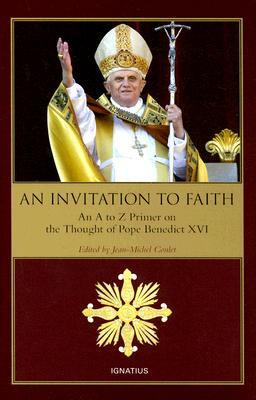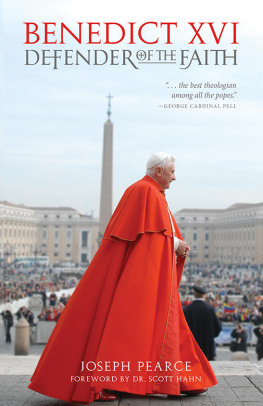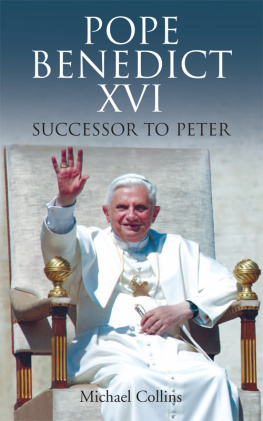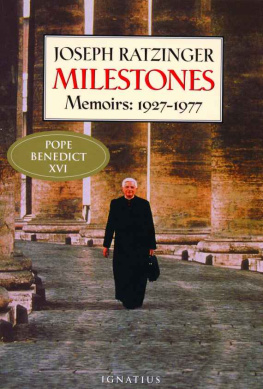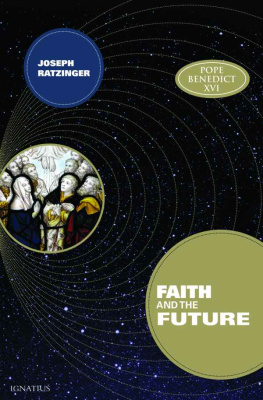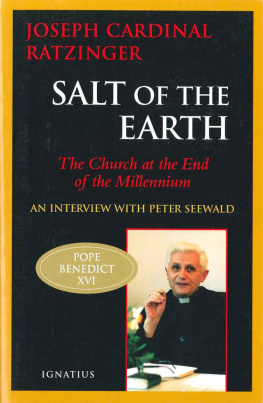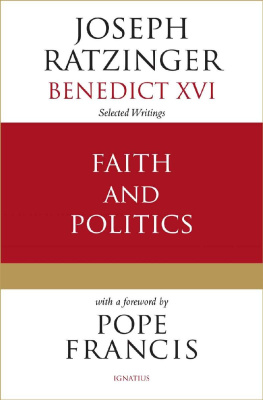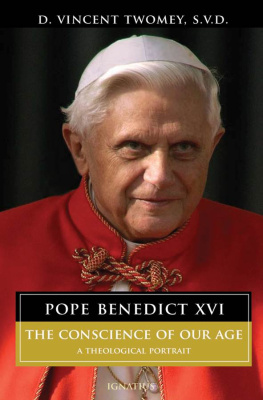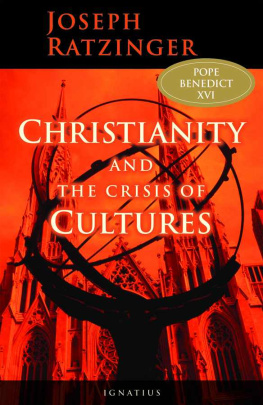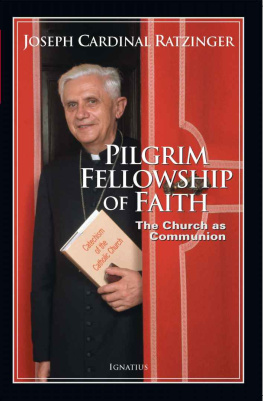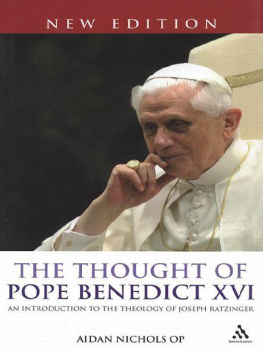Benedict XVI (Joseph Ratzinger) - An Invitation to Faith
Here you can read online Benedict XVI (Joseph Ratzinger) - An Invitation to Faith full text of the book (entire story) in english for free. Download pdf and epub, get meaning, cover and reviews about this ebook. year: 0, genre: Religion. Description of the work, (preface) as well as reviews are available. Best literature library LitArk.com created for fans of good reading and offers a wide selection of genres:
Romance novel
Science fiction
Adventure
Detective
Science
History
Home and family
Prose
Art
Politics
Computer
Non-fiction
Religion
Business
Children
Humor
Choose a favorite category and find really read worthwhile books. Enjoy immersion in the world of imagination, feel the emotions of the characters or learn something new for yourself, make an fascinating discovery.
- Book:An Invitation to Faith
- Author:
- Genre:
- Year:0
- Rating:4 / 5
- Favourites:Add to favourites
- Your mark:
- 80
- 1
- 2
- 3
- 4
- 5
An Invitation to Faith: summary, description and annotation
We offer to read an annotation, description, summary or preface (depends on what the author of the book "An Invitation to Faith" wrote himself). If you haven't found the necessary information about the book — write in the comments, we will try to find it.
An Invitation to Faith — read online for free the complete book (whole text) full work
Below is the text of the book, divided by pages. System saving the place of the last page read, allows you to conveniently read the book "An Invitation to Faith" online for free, without having to search again every time where you left off. Put a bookmark, and you can go to the page where you finished reading at any time.
Font size:
Interval:
Bookmark:
AN INVITATION TO FAITH
AN A TO ZPRIMER ON THE THOUGHT OF POPE BENEDICT XVI
Editedby Jean-Michel Coulet
Withan introduction by Cardinal Georges Cottier , O.P.
Englishtranslation supervised by Kate Marcelin -Rice
A Giniger Book
Publishedin association with
IGNATIUS PRESS SAN FRANCISCO
Title of the French original: L'Essence de la foi
2006 by Editions Plon , Paris
This translation is published byarrangement with The K. S. Giniger Company, Inc., New York
Cover photography by Stefano Spaziani
Cover design by Riz Boncan Marsella
The words of Pope Benedict XVI
2007 Libreria Editrice Vaticana
2007 by The K. S. Giniger Company
All rights reserved
ISBN 978-1-58617-213-8
Library of Congress Control Number2007921430
Printed in the United States of America
DearEnglish-speaking pilgrims, may the healing power ofChrist transform your lives and fill you with his peace!
May you [bestrengthened in] your love of the Universal Church and deepen yourcommitment to witness to the "Good News" of Jesus Christ.
As we strive tofollow closely the teachings of Jesus, may our faith guide our steps and givejoy to our hearts.
I pray that bythe intercession of the Blessed Lady, you will grow ever closer to her Son JesusChrist and share his Good News with all those you encounter.
May the light of Christ shine ever more brightlyand strongly in your lives!
Introduction
"Ibelieve, we believe". This formulation, which in the Catechism of the Catholic Church introduces the commentary on the profession of faith, brings us to an awareness of the dual polarityof the theological faith.
"Ibelieve". Adherence to the Word of God is a commitment of the wholeperson, called up from the depths of his freedom. It is the response to avocation that is unique because its source is divine love, and love is achoice.
"Webelieve". This is how we profess the ecclesial dimension of the faith. Thefaith of each individual is the faith of the Church. This is one of the mostbeautiful aspects of the Christian identity. The personal dimension in no way signifies withdrawal into privacy, nor does the ecclesialdimension mean absorption into the collective. Adult faith is recognized bythis: progress in interior devotion and progress in communion go hand in hand;they feed on each other.
This work,therefore, An Invitationto Faith, dedicated asit is to the words spoken by Pope Benedict XVI since the beginning of hisPontificate, invites us to nurture this faith and to go back to its source,which makes us say: "I believe, we believe".
Cardinal Georges Cottier ,O.P.
Theologian Emeritus of the Pontifical Household
Foreword
" Cooperatores veritatis " (collaborators in truth) is the motto of PopeJoseph Ratzinger , who chose the name Benedict when hewas elected to the Chair of Peter on April 19, 2005. Each of Peter's successorsis vested with the olim and the nunc : on the one hand, a faithful continuity with the work of his immediatepredecessors and the two-thousand-year-old tradition of the Church; on theother, the exercise of the Petrine ministry withunique sensitivity and keen attention to the signs of the times. In thefootsteps of John Paul II and in fidelity to Saint Augustine , his master in thought, hebecame the tireless pilgrim of the Truth to be shared, to be taught, to beexplained and to be discovered.
Benedict XVIimmediately challenged the relativism of our times, which rejects God, seesnothing as definitive and, according to him, sets asthe ultimate yardstick the individual's own ego and desires. The Pope offersinstead an opposing standard: Christ, the Son of God, the true man. His wordsare rousing and demand an examination of conscience. His words are for all. Hesays: "An 'adult' faith is not a faith that follows the trends of fashionor the latest novelty; a mature and adult faithis deeply rooted in friendship with Christ. It is this friendship that opens usup to all that is good and that gives us the criterion by which to distinguishthe true from the false, and deceit from truth." With strong words,Benedict XVI invites us to place God at the center of our lives. This book, An Invitation to Faith, is a selection of key words from the teachingsof the Holy Father, presented in alphabetical order. Benedict XVI invites us tobecome daily actors in the real revolution that comes from God and is calledLove.
Jean-Michel Coulet
Editor of the French-language edition of L'Osservatore Romano
anthropology
What is man?
It must be forcefullystated that man cannot and must not ever be sacrificed to the success ofscience and technology: this is why the so-called "anthropologicalquestion" assumes its full importance. For us, the heirs of the humanisttradition founded on Christian values, this question should be faced in thelight of the inspiring principles of our civilization.
***
The basicquestion today, as in the past, remains the anthropological question: What isman? From where does he come? Where must he go? How must he go? In other words,it is a matter of clarifying the conception of the human being on which newprojects are based. And you are rightly asking yourselves which human being,which image of man, does the university intend to serve: an individualwithdrawn into the defense of his own interests, a single perspective ofinterests, a materialistic perspective, or a person who is open to solidaritywith others in the search for the true meaning of existence, which must be acommon meaning that transcends the individual?
atheism
Lackof guidance?
How many people today are deceived byatheism, and seek to prove that it is scientific to think that all things lackguidance and order!
baptism
Acommunity of friends
Through Baptism eachchild is inserted into a gathering of friends who never abandon him in life orin death, because these companions are God's family, which in itself bears thepromise of eternity.
benedict
SaintBenedict, the search for God
Benedict pointed out tohis followers the search for God as the fundamental and, indeed, the one andonly aim of life: " Quaerere Deum". He knew, however, that when the believer enters into a profound relationshipwith God, he cannot be content with a mediocre life under the banner of a minimalistic ethic and a superficial religiosity. In thislight one can understand better the expression that Benedict borrowed fromSaint Cyprian and summed up in his Rule (IV, 21), the monks' program of life: " Nihil amori Christi praeponere ", "Let nothing be preferred to the love ofChrist." Holiness consists in this, a sound proposal for every Christianthat has become a real and urgent pastoral need in our time, when we feel theneed to anchor life and history to sound spiritual references.
charity
Lovein practice
Christian charity is firstof all the simple response to immediate needs and specific situations: feedingthe hungry, clothing the naked, caring for and healing the sick, visiting thosein prison, etc.
***
Christiancharitable activity must be independent of parties and ideologies. It is not ameans of changing the world ideologically, and it is not at the service ofworldly stratagems, but it is a way of making present here and now the lovewhich man always needs.
church and society
TheChurch, a factor of unity
In many developingcountries, I have also seen howthe Church with her Catholic unity is the great factor that unites indispersion. In many situations, the Church has remained the one reality that functions and makes life continue, thatprovides the necessary assistance, guarantees coexistence and helps to find thepossibility of creating one great solution. In this sense, in these situations,the Church also carries out a service that replaces the political level, givingthe possibility of living together and of rebuilding communion afterdestruction and of rebuilding, after the outburst of hatred, the spirit ofreconciliation.
Next pageFont size:
Interval:
Bookmark:
Similar books «An Invitation to Faith»
Look at similar books to An Invitation to Faith. We have selected literature similar in name and meaning in the hope of providing readers with more options to find new, interesting, not yet read works.
Discussion, reviews of the book An Invitation to Faith and just readers' own opinions. Leave your comments, write what you think about the work, its meaning or the main characters. Specify what exactly you liked and what you didn't like, and why you think so.

